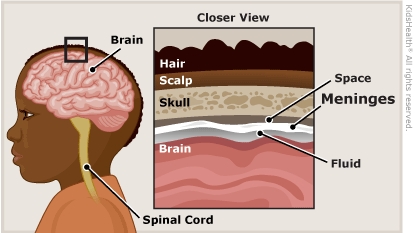Bacterial Meningitis: How to Care for Your Child
Bacterial meningitis happens when bacteria cause inflammation (swelling and irritation) of the covering of the brain and spinal cord (called the meninges). Bacterial meningitis is a serious illness. Your child was treated with antibiotics and can now be cared for at home while recovery continues.


-
You can give medicine for pain or fever if your health care professional says it's OK. Use these medicines exactly as directed:
-
acetaminophen (such as Tylenol® or a store brand)OR
-
ibuprofen (such as Advil®, Motrin®, or a store brand). Do not give to babies under 6 months old.
-
Don't give aspirin to your child. It could lead to serious medical problems.
Be sure to:
-
Follow up with your child's health care professional as scheduled, even if your child is doing well. Sometimes bacterial meningitis can cause complications later, such as slight changes in behavior, learning abilities, or thinking. The health care professional might need to do tests, such as checking your child's hearing.

-
Your child starts vomiting and cannot keep fluids down.
-
Your child's fever returns.
-
Your child appears to be getting sicker.
-
Has any of these signs of dehydration:
-
a dry or sticky mouth
-
peeing less
-
no tears when crying
-
sunken eyes

Your child:
-
Develops a severe headache.
-
Has a seizure.
-
Had a rash that cleared up, but develops a new rash.
-
Is unusually sleepy, hard to awaken, or very irritable.
-
Is acting confused or disoriented.

How is meningitis diagnosed? Health care professionals will do a lumbar puncture (spinal tap) to test a sample of the cerebrospinal fluid that surrounds the brain and spinal cord. Your child's test results showed that the meningitis was caused by bacteria.
Is bacterial meningitis contagious? Yes. The bacteria that cause meningitis spread in different ways. Some can spread through droplets when an infected person coughs or sneezes. Others can spread by eating food that is contaminated with bacteria. Your child should cough and sneeze into a tissue or an elbow. Until all symptoms are gone, caregivers should wash their hands well and often, and cups and utensils should not be shared.
Can meningitis be prevented? Safe and effective vaccines protect against some of the types of bacteria that can cause meningitis. Talk to your health care provider and make sure your child and other family members have received all recommended vaccines for their age, particularly the pneumococcal and meningococcal vaccines.